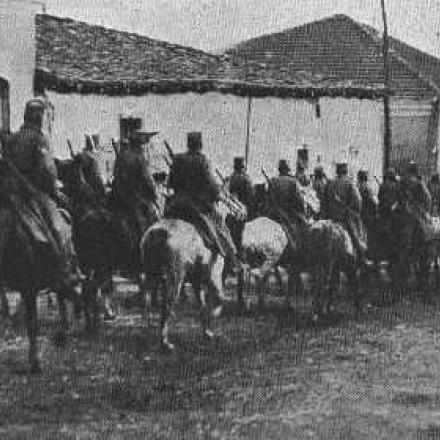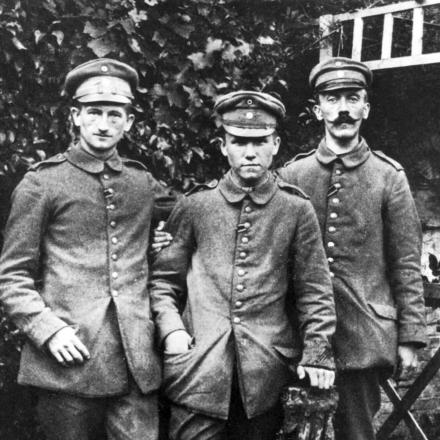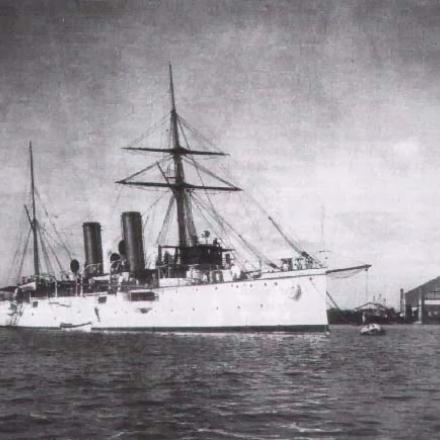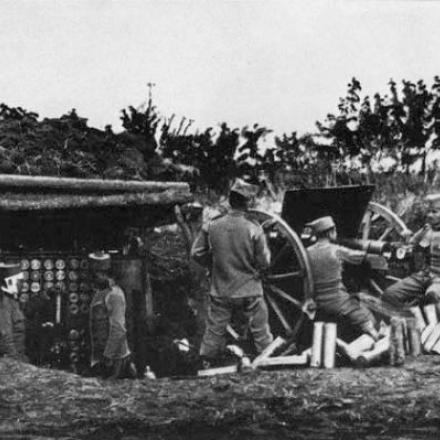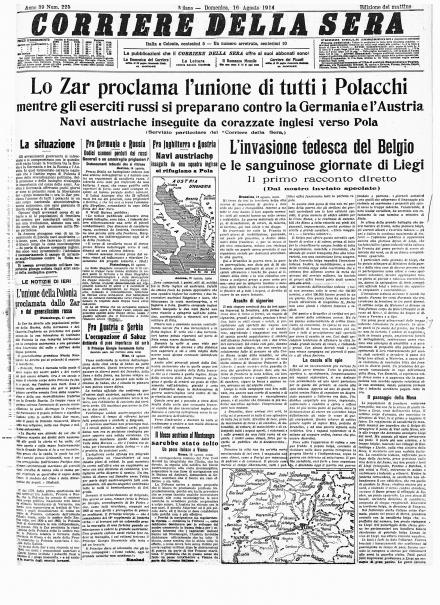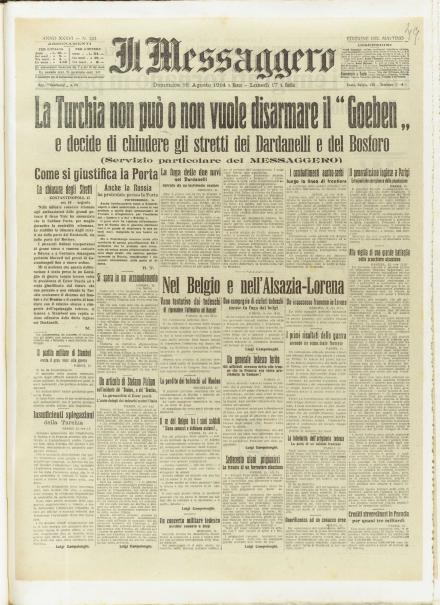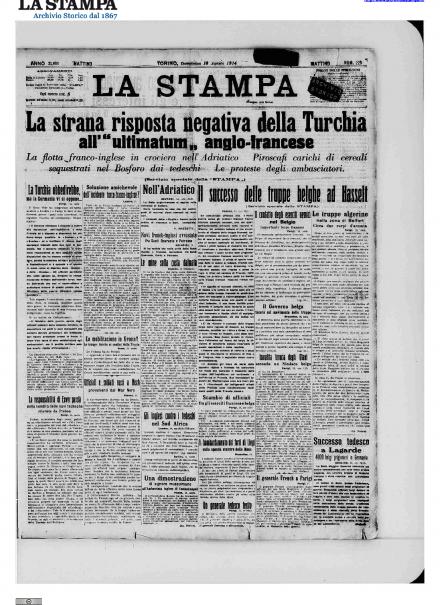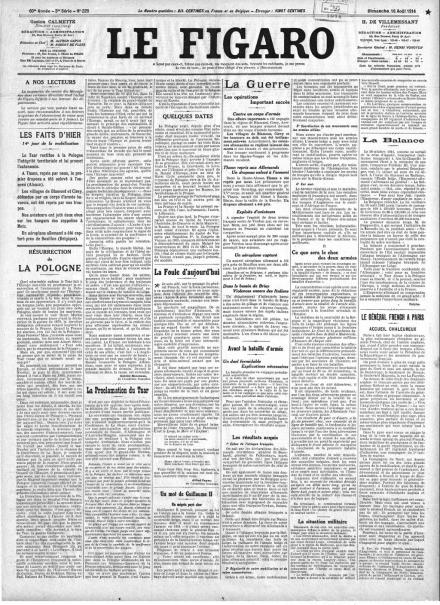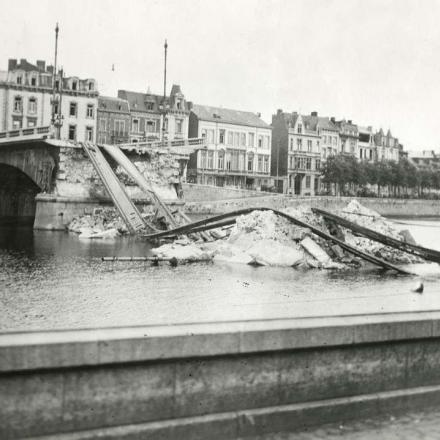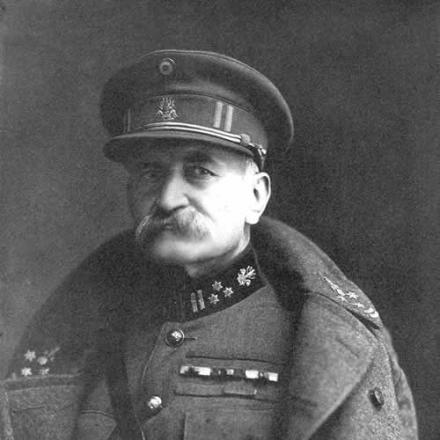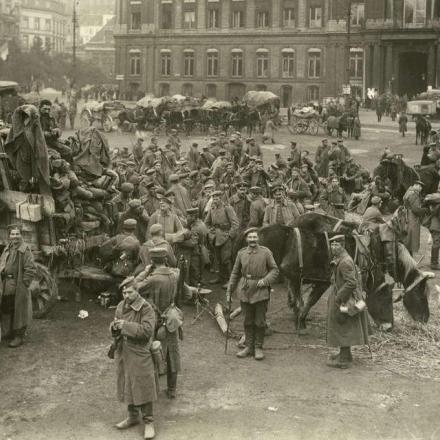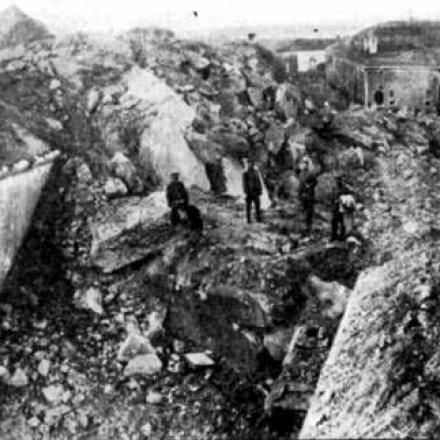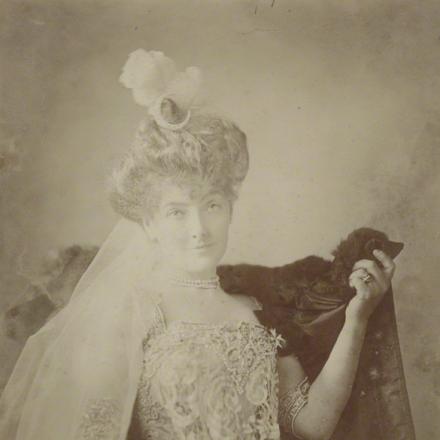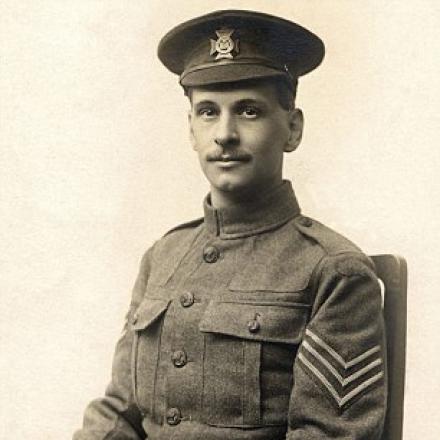La battaglia del monte Cer
Le ultime, ridotte e stremate sacche di resistenza a Liegi vengono spazzate via. Il grosso dell’esercito tedesco era comunque già avanzato. Ma i francesi penetrano nel nord dell’Alsazia e i russi nella Prussia orientale. È la guerra su due fronti, bellezza.
Il 16 agosto un volontario venticinquenne si arruola in Baviera. È un emarginato che sognava di diventare un artista, un pittore, ma l’Accademia di belle arti viennese lo respinse. È stato riformato dall’esercito asburgico l’anno prima, troppo gracile, emaciato; ferito nell’orgoglio rinuncia alla nazionalità austriaca. In Germania avrà maggior fortuna. È affascinato dall’ordine e dalla gerarchia; nell’esercito tedesco proverà finalmente un senso di appartenenza. Intriso di pangermanismo, in linea di massima nutre antipatia per qualsiasi altra “razza”. Adolf Hitler brutalizzerà il mondo.
Nei Balcani gli austro-ungarici e i serbi si affrontano nella battaglia del monte Cer.
I due eserciti contano più o meno 200.000 uomini a testa, con una leggera superiorità asburgica.
È il primo, grande, confronto diretto; si andrà avanti per tre giorni. A una trentina di chilometri di distanza Vienna incassa la presa di Šabac.
Intanto nell’Adriatico è arrivata l’imponente flotta anglo-francese. E si presenta subito a modo suo, colando a picco l’incrociatore austro-ungarico “Zenta”.
Davide Sartori
GLI AVVENIMENTI
Fronte occidentale
- Belgio: combattimenti a Wavre.
- Resa della piazzaforte di Liegi con la caduta dell'ultimo forte. L’armata belga si ritira verso Anversa.
- Completato lo sbarco in Francia del primo contingente della British Expeditionary Force composto da 4 divisioni, di cui una di cavalleria.
- I francesi vittoriosi nell’Alsazia del nord a Schirmeck.
Fronte orientale
- Offensiva russa nella Prussia Orientale.
Fronte meridionale
- Battaglia del Cer: i serbi tengono testa agli austro-ungarici durante la loro prima invasione della Serbia.
- L'esercito asburgico completa la conquista di Šabac.
Operazioni navali
- Lo squadrone navale franco-inglese entra nell’Adriatico: l’incrociatore leggero austriaco “Zenta” viene affondato.
Parole d'epoca
La caduta di Liegi
Il racconto di un generale belga e di un ufficiale tedesco
Gérard Leman
Generale dell'esercito belga, diario dalla prigione di Magdeburgo
On that day, at 4 o'clock in the afternoon, a German officer approached to within 200 yards of the fort with a signalling flag in his hand; and shortly afterwards, the siege gunners, having adjusted their range, began a fearful firing, that lasted a couple of hours. The battery on the left slope was destroyed, the enemy keeping on pounding away exclusively with their 21-centimeter cannons.
The third phase of the bombardment began at 5 o'clock in the morning of the 15th, firing being kept up without a break until two in the afternoon. A grenade wrecked the arcade under which the general staff were sheltering. All light was extinguished by the force of the explosion, and the officers ran the risk of asphyxiation by the horrible gases emitted from the shell.
When firing ceased, I ventured out on a tour of inspection on the external slopes, which I found had been reduced to a rubble heap.
A few minutes later, the bombardment was resumed. It seemed as though all the German batteries were together firing salvoes.
Nobody will ever be able to form any adequate idea of what the reality was like. I have only learned since that when the big siege mortars entered into action they hurled against us shells weighing 1,000 kilos (nearly a ton), the explosive force of which surpasses anything known hitherto. Their approach was to be heard in an acute buzzing; and they burst with a thunderous roar, raising clouds of missiles, stones, and dust.
After some time passed amid these horrors, I wished to return to my observation tower; but I had hardly advanced a few feet into the gallery when a great blast passed by, and I was thrown violently to the ground. I managed to rise, and continued my way, only to be stopped by a choking cloud of poisonous gas.
It was a mixture of the gas from an explosion and the smoke of a fire in the troop quarters. We were driven back, half-suffocated. Looking out of a peephole, I saw to my horror that the fort had fallen, slopes and counter-slopes being a chaos of rubbish, while huge tongues of flame were shooting forth from the throat of the fortress.
My first and last thought was to try and save the remnant of the garrison. I rushed out to give orders, and saw some soldiers, whom I mistook for Belgian gendarmes. I called them, then fell again. Poisonous gases seemed to grip my throat as in a vice.
On recovering consciousness, I found my aide-de-camp, Captain Colland, standing over me, also a German officer, who offered me a glass of water. They told me I had swooned, and that the soldiery I had taken for Belgian gendarmes were, in fact, the first band of German troops who had set foot inside the forts.
Lettera di un Ufficiale tedesco
General Leman's defence of Liege combined all that is noble, all that is tragic.
The commander of one fort (note: not Leman), at the moment when the bombardment was heaviest, went mad, and shot his own men. He was disarmed and bound. The cupola of another fort was destroyed by a bomb from a Zeppelin. Other forts were swept away like sand castles on the seashore before the relentless waves of the oncoming tide.
As long as possible General Leman inspected the forts daily to see that everything was in order. By a piece of falling masonry, dislodged by our guns, both General Leman's legs were crushed.
Undaunted, he visited the forts in an automobile. Fort Chaudfontein was destroyed by a German shell dropping in the magazine. In the strong Fort Loncin General Leman decided to hold his ground or die.
When the end was inevitable the Belgians disabled the last three guns and exploded the supply of shells kept by the guns in readiness. Before this, General Leman destroyed all plans, maps and papers relating to the defences. The food supplies were also destroyed.
With about 100 men, General Leman attempted to retire to another fort, but we had cut off their retreat. By this time our heaviest guns were in position, and a well-placed shell tore through the cracked and battered masonry and exploded in the main magazine. With a thunderous crash the mighty walls of the fort fell. Pieces of stone and concrete twenty-five cubic metres in size were hurled into the air.
When the dust and fumes passed away, we stormed the fort across ground literally strewn with the bodies of the troops who had gone out to storm the fort and never returned. All the men in the fort were wounded, and most were unconscious. A corporal with one arm shattered valiantly tried to drive us back by firing his rifle.
Buried in the debris and pinned beneath a massive beam was General Leman.
"Respectes le general, it est mort," said an aide-de-camp.
With gentleness and care, which showed they respected the man who had resisted them so valiantly and stubbornly, our infantry released the general's wounded form and carried him away. We thought him dead, but he recovered consciousness, and, looking around, said, "It is as it is. The men fought valiantly," and then, turning to us, added: "Put in your dispatches that I was unconscious."
We brought him to our commander, General von Emmich, and the two generals saluted. We tried to speak words of comfort, but he was silent - he is known as the silent general. "I was unconscious. Be sure and put that in your dispatches." More he would not say.
Extending his hand, our commander said: "General, you have gallantly and nobly held your forts." General Leman replied: "I thank you. Our troops have lived up to their reputations."
With a smile he added: "War is not like manoeuvres" - a reference to the fact that General von Emmich was recently with General Leman during the Belgian manoeuvres. Then, unbuckling his sword, General Leman tendered it to General von Emmich.
"No," replied the German commander, with a bow, "keep your sword. To have crossed swords with you has been an honour," and the fire in General Leman's eye was dimmed by a tear.
Diari
Lady Harriet Julia Camppbell Jephson
I sent a telegram off to Ems this morning, of course written in German, but the official behind the little window where I handed it in refused to send it until I showed him my passoport.
As I have not yet succeded in getting through the crowds at the police station I still had mine. we hear dreadful tales of hardships endured by those who have managed to get away from other places.
Some went by the Rhine steamers, wich are now running, but wherever they passed a fortress they were made to go below.
As the cabins were not enough for all, preference was given to other nationalities, and English people had to sit up all night on deck, even in pouring rain. The entire absence of news is for us quite terrible. One feels so out of the world, not knowing what is happening outside our prisoon doors.
The "Frankfurter Zeitung" is full of nothing but boasts and untruths.
A fresh "Bekanntmachung" has been posted up forbidding us to leave the town, and ordering us to be indoors by nine o'clock.
Parole d'epoca
Sgt Bernard Joseph Brookes
I had been sleeping at home all this time and had no uniform, but on Sunday 16th August for the first time I slept in Westminster Schools. Of course this was my first experience of sleeping on boards, but it is not so bad on the floor once one gets used to it.
